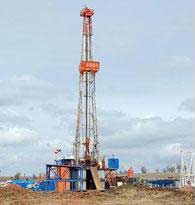This is the VOA Special English Economics Report.
Many people think the search for cleaner energy leads only to renewable resources like sun, wind and water. But it also leads to a fossil fuel. Natural gas is considered the cleanest of the fossil fuels, the fuels created by plant and animal remains over millions of years.
Burning it releases fewer pollutants than oil or coal. The gas is mainly methane. It produces half the carbon dioxide of other fossil fuels. So it may help cut the production of carbon gases linked to climate change.

Russia is first in what are called "proved reserves" of natural gas. The United States is sixth. Over the years, big oil and gas companies recovered much of the easily reached supplies of gas in America. They drilled straight down into formations where gas collects. As these supplies were used up, big drillers looked for similar formations in other countries.
But now the industry is taking a new look. Companies are developing gas supplies trapped inshale rock two to three thousand meters underground. They drill down to the shale, then go sideways and inject high-pressure water, sand or other material into the rock.
This causes the rock to break, or fracture, releasing the gas. Huge fields of gas shale are believed to lie under the Appalachian Mountains, Michigan and the south-central states.
Gas shale exploration is being done mainly by small to medium sized companies.
Eric Potter is a program director in the Bureau of Economic Geology at the University of Texas at Austin.
ERIC POTTER: "The types of opportunities that are left for natural gas exploration in the U.S. have changed. So it's a different class of resource -- not as easy to develop, and not even recognized as something worth pursuing, say, 20 years ago."
He says more than half the gas in the United States is now coming from these new reserves.
But hydraulic fracturing can also produce debate and anger over the risk of groundwater pollution. This method of drilling is not federally supervised under the Safe Drinking Water Act. Some in Congress want to end that exemption from the law.
Natural gas provides Americans with about one-fourth of their energy. And, unlike oil, most of it is produced in America. Gas producers invested heavily in reaching new supplies when prices were high. But prices are down sharply now because the recession cut demand for energy. So energy expert Eric Potter says it is too early to know how the new gas shale reserves will affect the market.
And that's the VOA Special English Economics Report, written by Mario Ritter. I'm Steve Ember.
methane: a colourless odourless flammable gas used as a fuel, the simplest alkane and the main constituent of natural gas 甲烷
shale: a fissile rock composed of layers of claylike, fine-grained sediments 頁巖,板巖
hydraulic fracturing: a method in which sand-water mixtures are forced into underground wells under pressure; the pressure splits the petroleum-bearing sandstone, thereby allowing the oil to move toward the wells more freely 水力壓裂
Related stories:
Brazil launches first fuel cell bus in Latin America
節能新招:洋蔥能發電
Increased biofuel production could harm water resources
Fuel Protests in India
(Source: VOA 英語點津編輯)